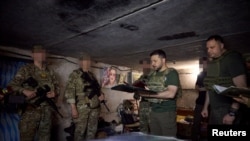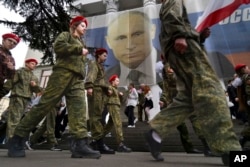During a July 20 briefing, Russian Foreign Ministry spokesperson Maria Zakharova said:
“[U.S.] Chairman of the Joint Chiefs of Staff Mark Milley opened up during a Pentagon news conference saying that Western curators had carefully planned the counter-offensive operation by the Ukrainian Armed Forces.”
That is false.
In a July 18 news conference after a virtual meeting of the Ukraine Defense Contact Group, Milley said:
“I will not say what’s going to happen in the future because that’s going to be a Ukrainian decision as to where and when they commit their reserve. Right now, they are preserving their combat power and slowly, and carefully, and deliberately working their way through all those minefields.”
Additionally, there is no evidence for Zakharova’s claim that Western curators planned Ukraine’s counteroffensive operation.
The clarification provided in Milley’s statement indicates that the Ukrainian Armed Forces determine their operational concepts independently.
The U.S. has provided Ukraine with lethal military to support its “sovereignty and territorial integrity within its internationally recognized borders.”
Since Russia launched its full-scale invasion of Ukraine on February 24, 2022, the U.S. State Department has repeatedly transferred security equipment to Ukraine, first declaring on February 26, 2022:
“This package will include further lethal defensive assistance to help Ukraine address the armored, airborne, and other threats it is now facing. It is another clear signal that the United States stands with the people of Ukraine as they defend their sovereign, courageous, and proud nation.”
The most recent U.S. military aid package to Ukraine, worth up to $400 million, includes artillery, air defenses and mine-clearing equipment.
In contrast to the Russian Foreign Ministry’s statements, Ukraine’s government has asked for more weapons than its partners can supply.
During Zakharova’s July 20 briefing, the U.S. was not the only target of her criticism.
She also accused “the Anglo-Saxons” of “catalyzing the Ukraine crisis and contributing to its escalation,” and claimed that "London thinks of the people" of Ukraine "as lab mice or guinea pigs and treats them as expendable material.”
Zakharova also said that those aiding Ukraine want President Volodymyr Zelenskyy “to earn his keep and to continue the suicidal counteroffensive at any cost.”
Such comments reflect the Eurasian nationalism that permeates the highest echelons of President Vladimir Putin’s administration. In his choice of language, the Russian president has taken to colonial terminology for the occupied territory of Ukraine.
Zakharova also suggested that supporters of Ukraine are indifferent to strategic outcomes and instead favor violent battlefield experimentation, stating: “On July 18, British Secretary of State for Defense Ben Wallace confessed that Ukraine is a 21st century ‘combat laboratory’ for the West.”
That is also a mischaracterization. In fact, in his comments, Wallace referred to the circumstances surrounding the Ukraine conflict as “tragic” and cautioned that nations would be foolish not to learn from them.
The Ukraine Defense Contact Group is a multinational alliance with nearly 50 nations that have provided security assistance to Ukraine. It enables the United States to approve Third Party Transfers (TPT) of American-made military hardware to Ukraine from controlled foreign stockpiles.
Overall, the Russian Foreign Ministry spokesperson’s accusations ignore the widespread support for Ukraine’s sovereignty. Russia’s invasion of Ukraine has negatively impacted the global economy, hindering critical supply chains and export infrastructure in the Black Sea.
In effect, degradation of the region’s agricultural base poses a threat to international peace, and efforts to mitigate its effects go beyond political maneuvering.
Many observers have noted that the conflict has sparked a spike in prices for commodities like fertilizers, hydrocarbons and food products.
In addition to providing military aid, the U.S. alone has committed over $16 billion in humanitarian aid to Ukraine. Alongside the Eastern European countries, which stand out as particularly generous, the U.S. has pledged a substantial investment in the pillars of stability. By such a measure, the Russian Foreign Ministry’s conspiratorial outlook appears hollow.







